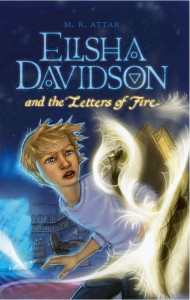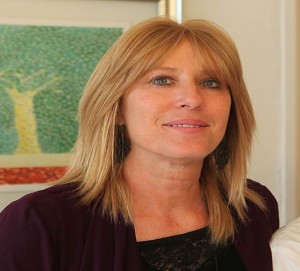 Mystery lurking behind every corner. An ancient city full of secrets. A mystical stone that imbues magical powers into a special little boy. It sounds like the opening of the next New York Times bestseller for young adults. In fact, these are the elements combined with a strong foundation in ancient Jewish texts, that make up the plot in Rhonda Attar’s first book of her trilogy, Elisha Davidson and the Letters of Fire. A book geared towards young adults (but appropriate for Jews of all ages), Letters of Fire follows the story of Elisha Davidson, a young student in the Old City of Jerusalem, and draws on a plethora of Jewish source material to build the mystery and layers of Elisha’s adventures.
Mystery lurking behind every corner. An ancient city full of secrets. A mystical stone that imbues magical powers into a special little boy. It sounds like the opening of the next New York Times bestseller for young adults. In fact, these are the elements combined with a strong foundation in ancient Jewish texts, that make up the plot in Rhonda Attar’s first book of her trilogy, Elisha Davidson and the Letters of Fire. A book geared towards young adults (but appropriate for Jews of all ages), Letters of Fire follows the story of Elisha Davidson, a young student in the Old City of Jerusalem, and draws on a plethora of Jewish source material to build the mystery and layers of Elisha’s adventures.
Rhonda Attar, the author of Elisha Davidson and the Letters of Fire, was not always an author—but she was always writing in her spare time, even as she navigated her way through the upper echelons of management in the early days of Israeli television. A woman whose energy radiates through her friendly voice and rapid speech, Rhonda’s journey to the top of Israeli media—and eventual book author—is a Hollywood scriptwriter’s dream.
Rhonda Antelman was born and raised on the East Coast and earned a Masters degree in television and radio at Brooklyn College. As she was about to accept a job as a production assistant in 1985, she had a sudden change of heart and decided to make aliya instead. “I was always very Zionistic, and so I said to myself, ‘Whatever happens, living in Israel will be the biggest luxury of my life,’” Rhonda recalled. She met and married her husband—an Israeli—three years later. “It’s like in the Torah —you jump into the water and Hashem splits the seas.” Thirty-one years later, she said she never regretted her decision.
Rhonda started her career in television in Israel as a writer and producer. She wrote for “The Nation,” a daily English newspaper publication in Israel as the country made do with only one major government-run television channel and before she got her start working in the television industry there. The country eagerly awaited the debut of its second major television channel, as did Rhonda. “It was really the Wild West days of Israeli television back than—everything was new, everything was changing,” she said. Rhonda began working for the government run Israeli TV channel, and she worked with some of the biggest names in television of the time, including Geraldo Rivera and Ted Koppel, as she produced their shows and interviews and transitioned their programs to Israel. Afterwards Rhonda helped launch the first commercial television channel (and the second overall channel) in Israel. Rhonda helped pioneer what Israeli television is today. She then moved on to work for some of the biggest names in Hollywood, licensing programs and bringing them to audiences in Israel.

“When I started out working in Israel, I really had four strikes against me: there was no respect for my Masters degree, I was not Israeli; I was a woman and I was religious! The atmosphere then was a very left-wing industry, and here I was, a right-wing religious woman,” Rhonda laughs. ‘But you know what? Hashem put me there for a reason, so it worked. We, my colleagues and I, grew to have so much respect for one another, and on account of this, I would say a lot of those people think differently now about religious Judaism.”
Rhonda eventually became the first woman to be a senior manager in Israeli television, and in that role worked to bring cable satellite channels to Israel, including the History Channel, women’s channels, and four MGM channels. She became the general manager, and then vice chairman of the company.
All the while, she never stopped writing.
“I had the idea for this book for many years, but I was so busy with work, with life—I never really had the time to put the story down on paper.” Now, as a consultant for one of the biggest media companies in Israel, Rhonda has had time to introduce Elisha to the world. It’s not surprising that someone who made a career out of storytelling mediums would be a wonderful storyteller herself.
Elisha’s stories were born when Rhonda ran her Shabbat group similar to others in the area—providing snacks, some games and some activities for the youngsters in the community, ranging in age from eight to thirteen—but added a special spin with the original stories she’d tell the group. When the teenagers in the neighborhood began sticking around on Shabbat afternoon to hear her tales, she realized she had something special on her hands.
“There is so much trash in the books that are marketed to teens—and here, [in Torah] we have the greatest treasure trove of stories!’ Rhonda exclaimed. The first book of the trilogy introduces protagonist Elisha Davidson. The book follows Elisha on his adventures, touching on Jewish concepts like the Beit Hamikdash, and the Kohen Gadol. As a timely point, the story begins at the onset of the Three Weeks, a period of mourning for the Temples, which began this year on July 5. Elisha’s story borrows from textual sources dating back thousands of years, and draws from ancient Jewish wisdom spanning the spectrum of the magic-like, to the more practical concepts of living life as a good person.
“Our stories, our texts, have life-changing wisdom in them,” said Rhonda. “I wanted to capture that in these books.” Rhonda is very clear that these books aren’t necessarily a parallel to another popular young boy imbued with magic powers. “These books draw on ancient wisdom, and they are all ‘Kosher Mehadrin’—all approved Torah and rabbinic sources.”
When asked why she thinks books like these and superhero stories seem to draw mass appeal, Rhonda quiets and answers thoughtfully. “You know, we are all created in the image of God, and we are created with the desire to emulate Him. He is all-powerful, and so people are attracted to stories that give them that power—the power of magic and sorcery, even when it isn’t real. When really, we should be trying to emulate other aspects of God, like His kindness and infinite love.” Rhonda continued, “People are attracted to power for themselves, as opposed to the power to make the world a better place.”
The words of this author reflect his/her own opinions and do not necessarily represent the official position of the Orthodox Union.